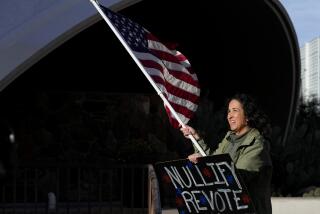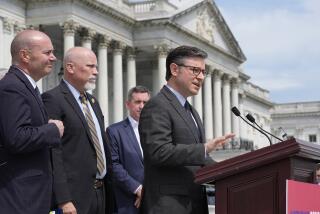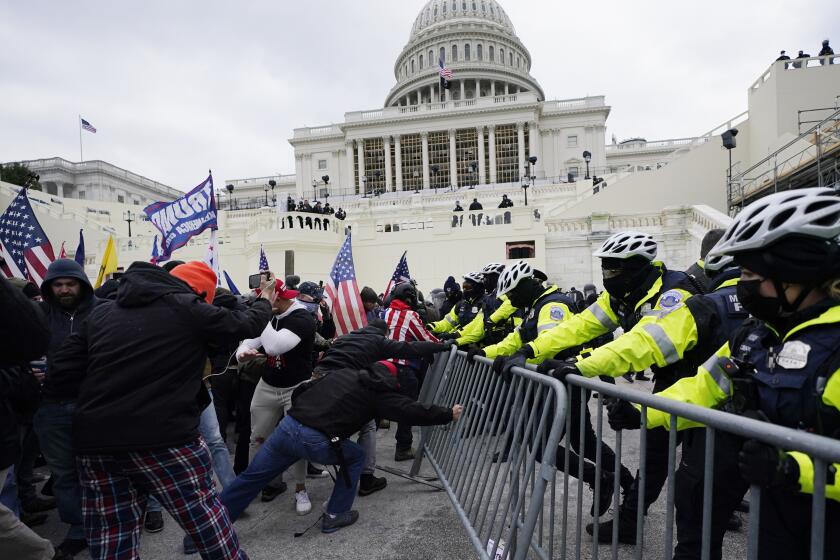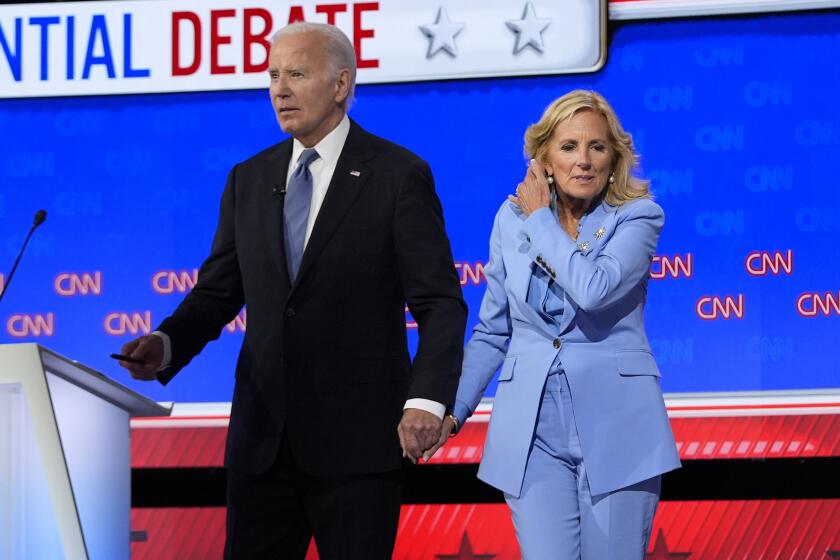Column: Will the 2020 elections be fair and safe from meddling? Fasten your seat belts, it’s going to be bumpy
Game on! The first votes of 2020 get cast within a week, in Iowa. And game in: The gaming of the American election system begins in earnest, too, with the social media manipulation, voter roll purges, Russian meddling, nutty conspiracy theories and incendiary rhetoric.
The body politic is sick; how can it be healed? The doctor is in: Richard L. Hasen, the election law expert and professor at UC Irvine’s law school. His new book, “Election Meltdown: Dirty Tricks, Distrust, and the Threat to American Democracy” offers a diagnosis and some cures. Hasen has been slagged by the right for truth-busting the “fraudulent fraud squad” and its cynical hollering about bogus voting, and slammed by the left when he criticized Stacey Abrams and her supporters for talking about the election for Georgia governor as being “stolen.”
In this country, we don’t run a single election. We run, he says, “nine or ten thousand” — local, regional and state elections, with many, many links and many vulnerabilities, technological and human, on the chain that holds the republic together. We hope.
*****
Let’s start with the nature of the problem, and you identify four primary dangers to elections, to the foundation of a democracy.
Well, there are four issues that go to why American trust in elections is declining. One is voter suppression, mostly done on the Republican side, which convinces Republicans that Democrats are trying to steal the election, and Democrats that Republicans are trying to steal the election.
The second is pockets of election administrator incompetence, places where it causes your hair to go on end when you care about how poorly some places run elections. It’s an exception rather than a rule. But in a close election, that’s where all the focus would be.
The third are old-fashioned and newfangled dirty tricks from Russian interference to some things that are being done domestically.
And then an increasingly troubling rhetoric about stolen and rigged elections. It’s not just President Trump. Sometimes Democrats are talking like that as well. And I think that undermines this idea that when you have a close election and the losers lose, they’re willing to accept those results and move on to fight the next battle.
One of the most chilling lines in the book is, “The national conversation is about whether it is norms rather than law that hold American democracy together.” Have we been relying on customs and gentlemanly practices for a couple of hundred years when it comes to elections?
Well, it’s a combination of law, politics and norms all together. But when the norms break down, really pressure is put on the law. And then you look at the law, and sometimes the laws are written in an unclear way. Then there’s room for more politics. There’s room for things to break down.
So we’ve stumbled along for a couple of centuries and patched things together when it comes to elections. Why is now such a dangerous point?
We have a confluence of a number of different factors. One is this hyper-polarization of our elections. People are very tribal. They see the other side as evil and not just the loyal opposition.
I think Trump’s rhetoric has exacerbated that polarization. People either love him or hate him, either love the Republican Party or they hate the Republican Party. And you add to that that we’re in a period of profound technological change where it’s possible to spread misinformation via social media. Now things can spread in a way that really undermines the ability to get at the truth.
And so [if] there’s a very close election, then all of the pressures in our society get kind of channeled into that election. The fight over that election could potentially lead to a meltdown.
We have now new versions of the voter suppression that you saw in the Jim Crow South, which was about keeping people from voting. Give some examples of voter suppression; what form does it take?
It’s interesting you raise that because in my 2012 book, “The Voting Wars,” I really tried to avoid the term “voter suppression.” I saw it as kind of incendiary, and really not yet at that point, proven that all of these efforts to make it harder to register and vote were necessarily driven by suppression.
But now, by 2020, I am using the term “voter suppression” because I do think that there’s really no good way to understand the whole host of laws that have been put forward almost exclusively by Republican legislatures and Republican election administrators and officials that make it harder to register or to vote.
You have voter purges. Now, sometimes voter purges or cleaning of voter rolls make sense because when people move or they die, their names are not necessarily removed from the voting rolls. But sometimes when this is being done in an aggressive way, and it’s being done without giving people a chance to re-register, it does create the risk that people are not going to be able to register and vote.
It also suggests that the whole idea of voting is a use-it-or-lose-it principle.
And that’s not how it works with other constitutional rights. You have the right to bear arms, we’re told under the 2nd Amendment. If you don’t use a gun, you still have that right to bear arms. You have the right to travel. All of these rights are things that should exist.
Now, of course, the Constitution itself doesn’t guarantee voting per se. And even in Bush v. Gore, the 2000 case that ended the disputed presidential election between Bush and Gore, the Supreme Court said that tomorrow, the states can decide to take away people’s right to vote for president and the state legislatures can keep that themselves.
So much of this depends on the norms that we think of what it is that people are guaranteed today in terms of their franchise.
You had a part in the book that actually did make me laugh, thinking of the immense effort that the Trump administration and its supporters have gone to prove virtually nonexistent voter ID fraud. You said it was an exceedingly dumb way to try to steal on an election because it depends on getting large numbers of people to pretend to be who they are, not asking them to commit a felony and then hope they do it the way you want them to.
Right, because you can’t even verify if someone’s going to go into the polling place pretending to be someone else. Because of the secret ballot, you couldn’t even verify it. That’s why there are really no cases in the modern era of organized attempts at this.
We do see attempts to steal elections occasionally. One example, back in the early 2000s in the small [Los Angeles County] city of Cudahy. Ballots were sent to City Hall and they were opened up and thrown away if they were votes for the challengers rather than incumbents who are already in power. So sometimes you see election officials doing things like that. That’s much easier to do in a small city where it’s hard to catch.
Election fraud, election crimes are very rare. When they do happen, they don’t happen in a way that voter ID laws would prevent.
And about electoral incompetence — there’s an example of a Democratic election official in Florida who simply didn’t put one measure on the ballot, and didn’t bother to count or count correctly some votes that were cast there. Florida seems like a mess when it comes to elections.
Yes. Those of us who are old enough to remember still think of Florida as the land of incompetence. You think they would have fixed it by now.
I tell the story in the book of Brenda Snipes, who was the election official in charge of Broward County, Fla., who, as you mentioned in one election, forgot to send out 58,000 absentee ballots requested by voters. She left a measure about medical marijuana off the ballot for some voters in one election.
I think the worst story comes out of Palm Beach County, where they were running three simultaneous recounts. They were using these ballot-counting machines. One of the workers thought the machine was going too fast and stuck a paperclip in it, which caused the machine to break and they couldn’t complete the recount. I mean, just really stuff that you would not expect that, in the 21st century, would be the way that people are running elections.
The close 2018 Georgia governor’s race was one of the diciest when it came to questionable voter disqualification, actual ballot counting and irregularities that Democratic candidate Stacey Abrams contended could have cost her the election against her Republican opponent, who was also Georgia’s secretary of state.
That raises two different concerns. One is if you start saying the election was stolen and you can’t prove it because the social science isn’t there, then people think your concerns are not important. And I think that’s troubling.
I think the focus should be, why is the state making it harder to register and to vote? Why is the state not accurately counting votes? And if someone’s vote is not counted and should be — that itself is a wrong, whether or not it affects turnout or the overall results of election.
The other problem is back to the issue of norms. How does democracy work? It works where the losers accept the election result as legitimate and they’re willing to fight another day.
If we start believing that whenever our side loses it’s because the other side cheated, then we might lose confidence in election results and we might no longer have a democracy, because we don’t believe that the election is being conducted fairly. And so maybe we won’t conduct elections fairly ourselves when we’re in charge.
You really want to have a system where the losers are willing to accept the election result. You think of Nixon in 1960 or Al Gore in 2000.
That’s not something that we really thought about. We always took for granted that the loser would concede in a close election. In 2020 I’m not so sure about that.
Wouldn’t Americans be astonished at how easily voting systems can be gamed? How haphazard it is? For example, you put too few voting booths in too few voting places, and the machines break down. And that you have those in the hands of partisan elected officials makes it all the more surprising.
This is the story of American elections for hundreds of years. It’s really hard to get out of this pattern of localized partisan-run elections. In my 2012 book, I proposed that we move to national automatic voter registration and national voter ID. And I like to say this is a proposal that united Democrats and Republicans. They both hated it.
Republicans hated the idea of universal voter registration. Democrats hated the idea of national voter ID.
You look at how most other countries run their national elections: There’s a national civil service entity that’s doing it. They also have much shorter and less complicated ballots. Here we have, in California especially, these very long ballots, very complicated elections. It takes weeks to run the counting.
And so there’s a technological problem. There’s a problem of partisanship. And there’s also the problem of just how do we get from here to there when there are vested interests that want to keep things the way they are?
Everything is put against this partisan grid. One of the foremost proponents of the myth of rampant voter fraud called you a “raw enemy activist.”
You may remember that President Trump falsely claimed that there were 3 to 5 million illegal votes cast in the 2016 election. He said they were all cast for his opponent, Hillary Clinton.
He set up a commission, the Pence-Kobach commission, which was supposed to ferret out voter fraud. It turned out to be a disaster. At one point, Trump decides to put on the commission what the Lawyers’ Committee [for Civil Rights Under Law] called the “four horsemen” of the voter suppression apocalypse. One of those people, a guy named J. Christian Adams, in an email that came out in litigation connected to this commission, called me a “raw enemy activist” and said that they should try to push my buttons.
So it was nice to get a little shout-out from this group, and it was even nicer to watch this group collapse after it was clear that it was not going to be able to accomplish what it was set out to accomplish. Instead, the commission was disbanded by the president, really with no proof that voter fraud is a major problem.
Redistricting has to be done in order to apportion congressional seats. But it too has become something of a weapon in voting wars. We have the story of Thomas Hofeller, a Republican who was called the guru of redistricting. He died, and how his papers reveal a great deal about partisan and race-driven motivations in redistricting.
I do think that the Thomas Hofeller papers do reveal not only that partisans will draw district lines and try to manipulate voting rules to partisan advantage, but what we also saw was at least credible information that some of these attempts were being hidden from the courts and that the courts were not being provided with accurate information about whether, for example, race was being taken into account when lines are being drawn.
The Supreme Court has said that when you make race the predominant factor in drawing district lines, that violates the equal protection clause of the Constitution. Republicans have drawn lines that have helped the Republican Party claim they’ve not been relying on racial data. And it turns out that in some cases they have.
Politics ain’t beanbag. But what we see coming up in the Hofeller papers is that some things were being done in ways that either violated the law or certainly violated the norms of how we think elections and election related rules should be crafted.
You talk about short-term, medium-term and other fixes in the book. One of them involves elder statesman and stateswomen, a bipartisan commission that will sit above the elections. So if they are close and contested and people don’t accept the results, these figures who would say, ‘Everybody calm down,’ and they would step in.
It’s hard to imagine that someone’s going to listen to a Colin Powell or a Madeleine Albright. I was talking to someone about this the other day and they said, maybe George W. Bush could be the person who could bring them together. But you think about the attacks that Trump has made on George W. Bush; the Republican Party has changed so much just in the last four years that are there really any credible bipartisan people who could come out and convince the people to come off the ledge?
I worry about that, which is why I think that trying to make whatever changes we can before the election actually happens is the best way to deal with this problem rather than trying to think about what we do once we have an election that goes to overtime. That’s really what gives me great concern.
There are so many levels at which you need to apply safeguards.
We’re always fighting the last battle, right? We’re worried about the kinds of things that happened in 2016. Well, in 2020, things might look different.
One of the great fears is deep fakes, this idea that we’re going to have manipulated audio and video. I’m not as worried that that in particular would sway an election. But the more general corrosive problem is that, well, we can’t tell what’s the truth anymore when we’re in our information cocoons. We only believe Fox News or MSNBC when we’re bombarded with calls that try to divide us.
All of this corrodes our confidence in the electoral process, in our democracy. And there are forces, unfortunately, not just outside the United States, but within the United States that are trying to do that right now.
If it’s a very close election, it doesn’t take too long to find a place where things were not done well or not done right. And given the forces of polarization, given the way that we’ve seen the president and others talk about how elections are conducted, I worry that in a very close election there will be a focus on that weakest link.
That could try to bring us down and really create a situation where, worse than Bush vs. Gore, half the country believes the election has been stolen, and is not going to stand for the inauguration of whoever the next president is going to be.
These are the kind of things that keep me up at night.
More to Read
A cure for the common opinion
Get thought-provoking perspectives with our weekly newsletter.
You may occasionally receive promotional content from the Los Angeles Times.







